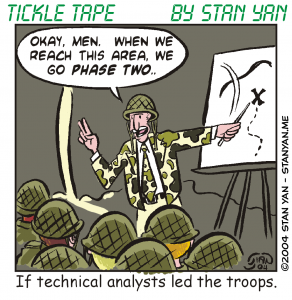If you’re like most traders, you expect to win. You put your time and energy into finding high probability setups, and after all the studying, searching, and theorizing, when you think you have come upon a good idea, you want it to work. Unfortunately, the markets don’t always cooperate. You have to go where the markets take you. In the end the markets are always right. How do you react when things don’t go your way? Do you feel upset? Are you angry? Do you want to get even?
When things don’t go your way, it’s very human and understandable to feel frustrated and angry. People experience anger when they feel that they have been unfairly wronged. It’s easy to get angry while trading the markets. You expect to win. You were counting on winning. And when the markets don’t cooperate, you feel a little hurt. Your ego is dinged and you are angry with someone: fate, yourself, imaginary institutional traders who are out to get you. The possibilities are endless. If you want to find someone to be angry with, you can find it, but it isn’t very productive.
Anger can be a dangerous emotion when trading the markets. When you feel angry, you are ready to put up a fight. You have a powerful inclination to focus all of your energy and resources on fighting, seeking revenge, and looking for any sign of provocation. It’s hard to think clearly when you are angry. Sound decision-making requires you to remain calm, focused, and flexible. There’s no reason to be angry at the markets. Here’s how you can be less angry at the markets.
First, don’t personify the markets. Anger is an interpersonal emotion. We are usually angry with someone because we believe that he or she has purposely tried to harm us. The markets may consist of people making trades, but it doesn’t make sense to make up imaginary relationships with the markets.
There is nothing that is personal going on. You are merely making it personal, and taking setbacks personally, as if someone were out to wrong you. The people participating in the markets may engage in actions that thwart your goals, but their actions are not directed toward you personally. It is best to look at the markets as an abstract impersonal entity. Pretend you are playing a videogame. The more impersonal you can make trading, the better you will feel, and the more profits you’ll realize.
Second, don’t expect anything to go your way. Practice radical acceptance. Whatever happens, happens, and there is little you could have done to change things. (All you can do is limit your risk.) Anger is felt when our expectations have been shattered. One expects to profit from a trade, and when the profits are not realized, he or she may become angry, seek revenge, and want to get even.
However, it isn’t useful to have high expectations in the markets. Don’t depend on the markets to fulfil your goals or meet your expectations. Assume that anything can happen. Indeed, in dealing with the markets, it’s almost a given that you will lose money, so it is not useful to expect to make money on every trade. Just accept what you can get. Using this thinking strategy will make you feel calm.
The more you can stay calm while trading the markets, the more profitably you will be. Don’t get frustrated, angry or upset. Take all setbacks in stride and enjoy the process of trading. You’ll find you’ll be calmer, focused, and more profitable.


